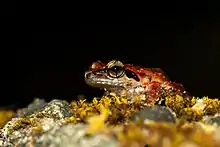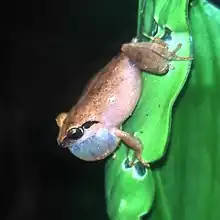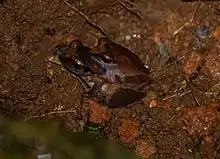Pseudophilautus wynaadensis
Pseudophilautus wynaadensis, commonly known as the Wayanad bush frog, common bush frog, jerdon's bush frog, plain-colored bush frog, Malabar coast frog, or dark-eared bush frog, is a species of frog in the family Rhacophoridae. It is endemic to the Western Ghats of southwest India.
| Pseudophilautus wynaadensis | |
|---|---|
 | |
| Scientific classification | |
| Domain: | Eukaryota |
| Kingdom: | Animalia |
| Phylum: | Chordata |
| Class: | Amphibia |
| Order: | Anura |
| Family: | Rhacophoridae |
| Genus: | Pseudophilautus |
| Species: | P. wynaadensis |
| Binomial name | |
| Pseudophilautus wynaadensis | |
| Synonyms[2] | |
|
Phyllomedusa ? wynaadensis Jerdon, 1853 | |
Description

Pseudophilautus wynaadensis males measure 24–28 mm (0.94–1.10 in) in snout–vent length; a female measured 27 mm (1.1 in) SVL. The body is rather slender. Colouration varies, even within the same population, from uniform grey to brownish or reddish grey. The upper two-thirds of the tympanum is dark black. The dorsum has spinular projections.[3]
Distribution
It is found widely in southern Western Ghats from the regions of Coorg and Wayanad to Periyar, on both sides of the Palakkad Gap.[1][2][3]
Habitat
Pseudophilautus wynaadensis is associated with the understorey of tropical moist evergreen forest and shrubland, as well as secondary forest and cultivated land (such as tea and coffee plantations).[1] It is among the most common bush frogs in the area, and a dominant one in wayside vegetation and urban areas.[3] It is nocturnal and arboreal.[1]
References
- "Pseudophilautus wynaadensis". IUCN Red List of Threatened Species. Retrieved 28 August 2014.
- Frost, Darrel R. (2018). "Pseudophilautus wynaadensis (Jerdon, 1853)". Amphibian Species of the World: an Online Reference. Version 6.0. American Museum of Natural History. Retrieved 18 July 2018.
- Biju, S. D. & Bossuyt, Franky (2009). "Systematics and phylogeny of Philautus Gistel, 1848 (Anura, Rhacophoridae) in the Western Ghats of India, with descriptions of 12 new species". Zoological Journal of the Linnean Society. 155 (2): 374–444. doi:10.1111/j.1096-3642.2008.00466.x.

